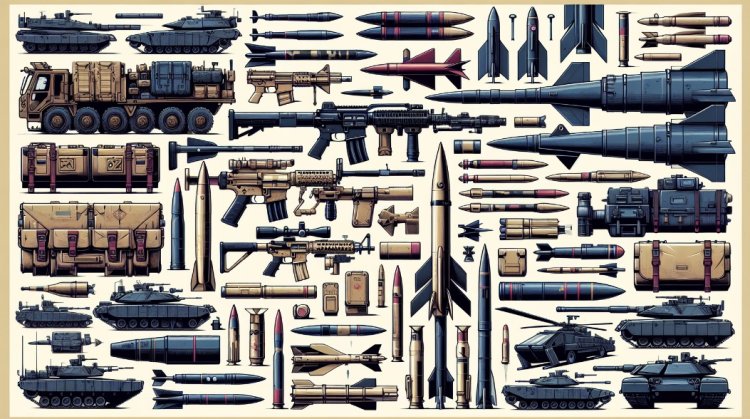Hezbollah's Arsenal: Rockets, Missiles, and More
Unveil the secrets of Hezbollah's arsenal, exploring their diverse range of rockets, missiles, and other weaponry. Discover their capabilities and threats to regional stability.

The Unconventional Power of Hezbollah
Welcome to our blog post, where we dive into the capabilities and potential outcomes of Hezbollah's arsenal. As the war in Gaza continues, Hezbollah remains a wildcard in the Middle East conflict. This armed group, known for its large and well-equipped forces, has the potential to pose a significant threat to Israel. In this blog post, we will explore Hezbollah's weapons and capabilities, focusing on its rocket and missile arsenal.
Hezbollah's troop strength
Hezbollah is estimated to have up to 50,000 troops, according to the Israeli military. However, Hezbollah's leader, Nasrallah, claims they have 100,000 troops, though this likely includes reservists. It is essential to note that Hezbollah is not equipped like a regular army. The majority of its forces are light infantry trained for urban combat and equipped with portable weapons such as RPGs and anti-tank guided missiles. Hezbollah does not possess tanks or meaningful tube artillery systems.
Rockets and Missiles: Hezbollah's Preferred Weapons
Hezbollah heavily relies on rockets and missiles in its arsenal. These weapons provide Hezbollah with the ability to strike Israel from a distance, reducing the risk to its forces. Hezbollah's rocket and missile systems vary in range and payload capacity. Some rockets have long-range capabilities, while others are smaller and more mobile.
Quantity and Types of Rockets and Missiles
The exact number and types of rockets and missiles in Hezbollah's arsenal are unknown. Estimates range from 100,000 to 200,000 rockets and missiles. However, it is crucial to understand that most of these are unguided rockets with limited range and accuracy.
Hezbollah's Rocket Arsenal
Hezbollah's rocket arsenal primarily consists of unguided rockets, including the Fajr-3 and Fajr-5 rockets. These rockets have ranges of 40km and 13km, respectively. While they can cause damage, they are not as effective as more precise missiles. Hezbollah also possesses 107mm and 122mm rockets, which are smaller and more easily reloaded. These rockets have ranges between 10km and 40km.
Precision Missiles: A Potential Threat
Hezbollah's more advanced missiles, such as the Zelzal and Fateh-110, pose a greater threat to Israel. These missiles are larger and have the potential for greater accuracy. Some reports suggest that Hezbollah has modified some of these missiles to use satellite guidance, increasing their precision. However, it is important to note that precision missiles are likely not as plentiful as unguided rockets in Hezbollah's arsenal.
The Effectiveness of Hezbollah's Rocket Attacks
Hezbollah's rocket attacks primarily target Israeli civilian areas, aiming to create fear and terrorise the population. While these attacks can cause damage, they are unlikely to inflict significant harm on Israel's military or economy. Israel has developed the Iron Dome missile defence system to intercept and destroy incoming rockets. The Iron Dome has been highly effective, boasting an interception rate of 85–90%. Additionally, Israel's other defence systems, such as the Patriot and David's Sling, provide further protection against missile threats.
Hezbollah's Capacity and Israel's Defence
Hezbollah has the capacity to fire 2500 rockets per day into Israel, according to an Israeli military commander. However, during the 34-day war in 2006, Hezbollah fired an average of 120 rockets per day. Israel's defence systems, combined with its constant surveillance, make it challenging for Hezbollah to amass a large number of launch vehicles unnoticed. While no defence system is foolproof, Israel's interceptors have proven effective against Hezbollah's rocket attacks.
The Role of Precision Missiles
Hezbollah's more precise missiles could pose a greater threat to Israel's military infrastructure and economic targets. However, the exact number of these missiles is unknown, and Israel's defence systems, including the Iron Dome, Patriot, and David's Sling, have the capability to intercept and destroy them. It is important to note that Israel's defence systems are not infallible, and a coordinated attack with large numbers of missiles could overwhelm the defence systems.
Hezbollah's Use of Drones
Hezbollah has also incorporated drones into its arsenal, with an estimated inventory of around 2,000 drones of various sizes. These drones provide Hezbollah with additional surveillance and potential attack capabilities. Hezbollah has used drones to gather intelligence and conduct limited airstrikes. However, these drones are not as advanced as those used by major military powers and can be targeted and brought down by anti-aircraft measures.
Hezbollah's Strategy: A Deterrent Rather Than an Offensive Force
While Hezbollah possesses a significant arsenal of rockets, missiles, and drones, its main strength lies in its infantry forces. Hezbollah's strategy is not focused on launching full-scale attacks into Israel, as this would likely result in heavy casualties for their forces. Instead, Hezbollah relies on its rocket and missile arsenal as a deterrent and a weapon of terror. By threatening rocket attacks, Hezbollah aims to create fear and uncertainty in Israel rather than inflicting significant damage.
Conclusion
Hezbollah's arsenal of rockets, missiles, and drones presents a threat to Israel, but it is important to understand the limitations of these weapons. Israel has developed advanced defense systems to intercept and destroy incoming rockets, significantly reducing the potential harm caused by Hezbollah's attacks. While precision missiles pose a greater threat, their numbers are limited, and Israel's defence systems can mitigate the risks. Ultimately, Hezbollah's strength lies in its infantry forces, which are more effective in defensive operations than offensive actions against Israel.
Frequently Asked Questions
Q: How many rockets and missiles does Hezbollah have?
The exact number is unknown, with estimates varying from 100,000 to 200,000 rockets and missiles.
Q: Can Israel defend against Hezbollah's rocket attacks?
Yes, Israel has developed the Iron Dome missile defence system, along with other defence systems, to intercept and destroy incoming rockets. These systems have proven highly effective, boasting interception rates of 85–90%.
Q: Are Hezbollah's precision missiles a significant threat to Israel?
While precision missiles pose a greater threat, their numbers are limited. Israel's defence systems, such as the Iron Dome, Patriot, and David's Sling, are capable of intercepting and destroying these missiles.
Q: What is Hezbollah's main strategy?
Hezbollah relies on its rocket and missile arsenal as a deterrent and a weapon of terror. Its main strength lies in its infantry forces, which are more effective in defensive operations.



 admin
admin 










